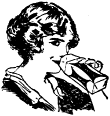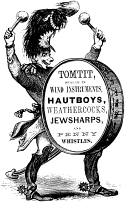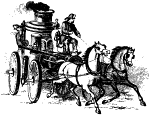Search us!
Search The Word Detective and our family of websites:
This is the easiest way to find a column on a particular word or phrase.
To search for a specific phrase, put it between quotation marks. (note: JavaScript must be turned on in your browser to view results.)
Ask a Question! Puzzled by Posh?
Confounded by Cattycorner?
Baffled by Balderdash?
Flummoxed by Flabbergast?
Perplexed by Pandemonium?
Nonplussed by... Nonplussed?
Annoyed by Alliteration?

Don't be shy!
Send in your question!
Columns from 1995 to 2006 are slowly being added to the above archives. For the moment, they can best be found by using the Search box at the top of this column.
 If you would like to be notified when each monthly update is posted here, sign up for our free email notification list.
If you would like to be notified when each monthly update is posted here, sign up for our free email notification list.
Trivia
All contents herein (except the illustrations, which are in the public domain) are Copyright © 1995-2020 Evan Morris & Kathy Wollard. Reproduction without written permission is prohibited, with the exception that teachers in public schools may duplicate and distribute the material here for classroom use.
Any typos found are yours to keep.
And remember, kids,
Semper Ubi Sub Ubi
|
And hot dogs old enough to vote.
Dear Word Detective: I was raised in Chicago, Memphis, Atlanta and Omaha. Now I live in Detroit with my native Detroit-er husband. I am often going to little stores to buy things like Tums and cigarettes. I have always called these places “convenience stores,” or, perhaps, “corner stores.” But my husband calls them “party stores.” Why does Michigan insist on calling these places “party stores”? Certainly, I understand that liquor, beer and smokes often lead to a party. Is the rest of the country just not having as much fun as Michigan? — Fritz.
I don’t know why Michigan calls them “party stores,” but it makes me want to move there. Our little town here in rural Ohio doesn’t even have a convenience store  anymore. A few years ago it was bought by a very nice man from Pakistan. I got along with him just fine, but apparently a critical mass of the locals decided that he was a one-man terrorist sleeper cell and boycotted him right out of business. I really wish I were making that up. anymore. A few years ago it was bought by a very nice man from Pakistan. I got along with him just fine, but apparently a critical mass of the locals decided that he was a one-man terrorist sleeper cell and boycotted him right out of business. I really wish I were making that up.
Regional dialectical variations such as “party store” for what the rest of us call a “carry-out” or “convenience store” are common in the US. There’s even an organization dedicated to studying the phenomenon (the American Dialect Society) and an ongoing scholarly project, the Dictionary of American Regional English (DARE) cataloging local lingo in minute detail. Michigan shares many of the variations of what linguists call the Inland North along with Illinois, Indiana, Ohio and Wisconsin. Things get a bit weirder as you travel north in Michigan, where the residents of the Upper Peninsula (known as “Yoopers” from the initials UP) exhibit a vocabulary, phonological intonations and habits (especially ending sentences with “eh?”) more often associated with Canada.
Back at “party store,” I’d imagine the name arose because such places are where you buy the ingredients of an informal party, as opposed to the supermarket where one does “serious” food shopping (i.e., beyond beef jerky and cheese popcorn). In my ancestral home of New York City, such a little shop is known as a “bodega” (boh-DAY-guh), from the Spanish meaning “wine shop,” derived in turn from the Greek “apotheke,” store or depot, which also gave us “apothecary,” an old-fashioned name for a drugstore.
As to why “party store” became popular in Michigan and not in, say, Georgia, I’d chalk it up to pure happenstance, unless Michiganders really are having more fun than the rest of us.
Enough, already.
Dear Word Detective: We’ve had recent occasion in Minneapolis for politicians to bloviate more than usual. I heard one on the radio this morning saying “We need fulsome debate on this subject.” His use of “fulsome” threw me for a loop. I’d always thought “fulsome” was a negative word, more or less meaning “offensive,” but he was clearly using it (twice) to mean “extensive” debate. Am I still living in the  17th century or has the word changed that much? — Barney Johnson. 17th century or has the word changed that much? — Barney Johnson.
Good question. Incidentally, my spell-checker (in Open Office) doesn’t recognize the word “bloviate,” and suggests that you may mean “alleviate.” Has Minneapolis stumbled on politicians who actually “alleviate”? If so, please share with the rest of us.
OK, Andy Rooney mode off. “Bloviate” is a fine old (19th century) word meaning “to speak at length in empty, pompous rhetoric,” and probably comes from “to blow” in the sense of “to boast” (as in “blowhard”). The word was popularized by President Warren G. Harding, who was no slouch at “bloviation” himself.
As for “fulsome,” your puzzlement is justified. “Fulsome” first appeared in Middle English (from “ful,” full, plus “som,” meaning “possessing” or “characterized by”), and initially, in the 13th century, meant simply “abundant, plentiful.” Extended uses of the word soon appeared, giving us “fulsome” (plump) people and “fulsome” (profound) devotion to religion. Fairly early on, however, “fulsome,” especially as used among the literati and upper echelons of society, also took on the meaning of “too much of a good thing.” A “fulsome” meal, once merely “satisfying,” became “gross” and “nauseating.” “Fulsome praise” came to mean not simply kind compliments but overblown, cloying and quite possibly utterly insincere toadying. By the 16th century, in fact, “fulsome” had come to mean “disgusting, foul, loathsome.”
This transformation in the usage of “fulsome” was not unprecedented in English (after all, “nice” used to mean “stupid”), but what made it unusual was that people also continued, during this same span of several centuries, to use “fulsome” in its original positive sense of “abundant.” This led, not surprisingly, to occasional confusion, but the context in which the word was used usually could be used to judge the meaning meant.
By the 20th century, the pejorative sense of “fulsome” had abated somewhat, and it was usually used, in the phrase “fulsome praise” for instance, to mean simply “overblown, excessive” (rather than “vile and disgusting”). Since the 1960s, however, there has been an increase in the use of “fulsome,” even in phrases such as “fulsome praise,” to mean simply “abundant, complete.” This may be due to the fact that “fulsome,” at first glance, appears to be a positive word. Who, after all, doesn’t like “full”? To listeners unfamiliar with the previous negative connotations of “fulsome” (a class which probably includes, at this point, most English speakers), “fulsome” sounds like a good thing. And to a politician, always on the lookout for a pompous locution, replacing “full” with “fulsome” is just what the spin doctor ordered — instant “gravitas” in one little word. So I guess we’d better get used to it.
River of bumps.
Dear Word Detective: On a recent visit to Savannah, GA, my wife asked me about the smooth cobblestones on the streets in the historic River District. When she asked me about the origin of the word “cobblestone,” I did not know. Can you help? — Wayne Bollinger.
 Clippity-clop, clippity-clop, clippity-clop. There, I finally found an excuse to do my horse-on-a-cobblestone-street imitation (although it’s really much more impressive in person). Now if I can just work the screech of a red-tailed hawk into one of these columns, my life will be complete. You’d never guess that my childhood hero was Gerald McBoing-Boing, would you? Clippity-clop, clippity-clop, clippity-clop. There, I finally found an excuse to do my horse-on-a-cobblestone-street imitation (although it’s really much more impressive in person). Now if I can just work the screech of a red-tailed hawk into one of these columns, my life will be complete. You’d never guess that my childhood hero was Gerald McBoing-Boing, would you?
Cobblestones are cool. For those poor souls who have spent their lives trapped in the asphalt wastelands of suburbia, I should explain that “cobblestones” are small (usually six inches or less across) rounded stones set in sand or mortar, a method of paving streets common from the late Middle Ages into the 18th century. Long since replaced with asphalt and similar “smooth” (i.e., boring) sorts of pavement in most places, cobblestone streets still exist, frequently preserved in “historic” sections of cities. When last I checked, there were still several cobblestone streets in New York City’s Soho neighborhood, for instance. If you’ve never heard horses’ hooves on a cobblestone street, you’ve missed one of life’s most evocative sounds.
I have, on occasion, made a few snide jokes about the accuracy (or lack thereof) of the do-it-yourself online encyclopedia Wikipedia. Many parts of Wikipedia, as the curate said of the egg, are quite good. But every so often I come across a real clunker. When Wikipedia announces that “cobblestones” are so called because they are “cobbled (roughly assembled)” to form pavement, they stumble and land face down in the street. The verb “to cobble,” meaning “to join or mend clumsily” (source of the derivative noun “cobbler,” one who repairs shoes or makes simple repairs) has no connection to “cobblestone.” See me after class, Wikipedia.
“Cobblestone” is derived from the very old English word “cob,” which had a wide range of meanings, one of which was “rounded lump” with overtones of large size. The “cob” in “corn-cob” invokes a slightly different sense of “cob,” that of “top” or “head” (which, in some people, is also a large rounded lump, but I digress). “Cobweb,” since you were about to ask, has nothing to do with “cob,” and comes from the Middle English “coppe,” meaning “spider.”
“Cobble,” which appeared in the 15th century, simply added the diminutive suffix “le” to “cob,” and meant a small stone rounded by the flow of water, essentially a large pebble. It was these smooth “cobbles,” gathered from stream beds, that paved the first “cobblestone” streets.
|
Makes a great gift! Click cover for more.  
400+ pages of science questions answered and explained for kids -- and adults!
FROM ALTOIDS TO ZIMA, by Evan Morris
 
|
 anymore. A few years ago it was bought by a very nice man from Pakistan. I got along with him just fine, but apparently a critical mass of the locals decided that he was a one-man terrorist sleeper cell and boycotted him right out of business. I really wish I were making that up.
anymore. A few years ago it was bought by a very nice man from Pakistan. I got along with him just fine, but apparently a critical mass of the locals decided that he was a one-man terrorist sleeper cell and boycotted him right out of business. I really wish I were making that up.

 can be found
can be found 
 17th century or has the word changed that much? — Barney Johnson.
17th century or has the word changed that much? — Barney Johnson. Clippity-clop, clippity-clop, clippity-clop. There, I finally found an excuse to do my horse-on-a-cobblestone-street imitation (although it’s really much more impressive in person). Now if I can just work the screech of a red-tailed hawk into one of these columns, my life will be complete. You’d never guess that my childhood hero was Gerald McBoing-Boing, would you?
Clippity-clop, clippity-clop, clippity-clop. There, I finally found an excuse to do my horse-on-a-cobblestone-street imitation (although it’s really much more impressive in person). Now if I can just work the screech of a red-tailed hawk into one of these columns, my life will be complete. You’d never guess that my childhood hero was Gerald McBoing-Boing, would you?



Recent Comments